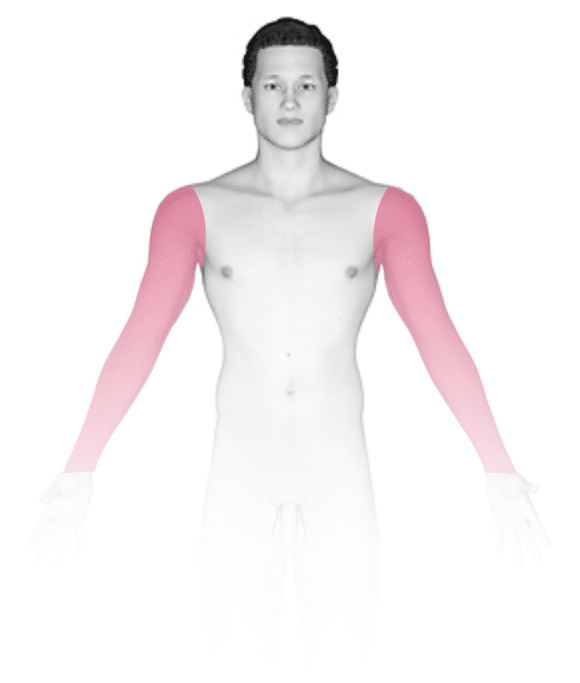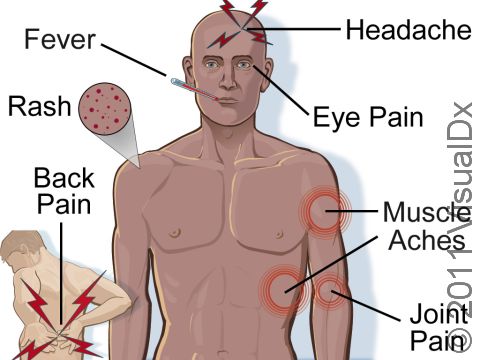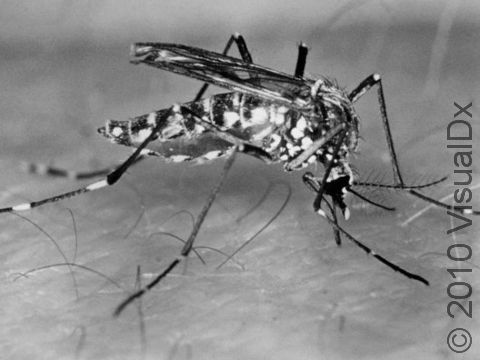Dengue Fever
Dengue fever is a viral illness passed to humans through the bite of an infected mosquito. The disease is rare in the United States, with approximately 200 cases occurring every year, but it is common worldwide, with up to 100,000 cases a year. The mosquitoes that carry the dengue fever virus (a member of the flavivirus family) live in tropical areas, and they tend to bite humans during the day. There is a delay of about 2–7 days between the mosquito bite and the onset of symptoms, so it is possible that travelers to these areas will return home before they start having symptoms. Dengue fever is not contagious between humans; it is only passed from mosquitoes to humans. However, an infected human could pass the virus back to a mosquito, which could then infect other humans. Dengue fever is also known as breakbone fever, because the illness causes terrible muscle and bone pain.
Who's At Risk?
Travelers to endemic areas, such as Caribbean, Central America, South America, Southeast Asia, and Africa, should be aware of the risk of dengue fever. Children tend to have more severe disease with increased risk of death.
Signs & Symptoms
The symptoms of dengue fever usually occur in 2 phases, starting 2–7 days after the mosquito bite.
Early phase (first 3–4 days):
- High fever
- Chills
- Eye pain
- Headache
- Muscle and joint pain, particularly the lower back
Later phase (second 3–4 days):
- Diminishing fever (defervescence)
- Rash – typically, bright red-purple dots appearing first on the arms, and legs, and possibly pink-red patches all over the body
- Nausea
- Vomiting
- Cough
- Sore throat
- Runny nose
- Sometimes return of high fever
- Occasionally, presence of bleeding from the nose and gums in hemorrhagic (bleeding) symptoms
- Rarely, organ failure from massive internal bleeding
Self-Care Guidelines
To prevent dengue fever, protect yourself from all mosquito bites:
- Wear neutral-colored long-sleeved shirts and pants that have been pretreated with a special long-lasting insecticide.
- Cover exposed skin with insecticide.
- Sleep under a mosquito net.
- Avoid spending time outdoors during the day, when dengue fever mosquitoes are mostly likely to bite.
- Get rid of areas of standing water, such as tires, flower pots, and puddles that may breed mosquitoes.
- Before traveling to any tropical climate, check with the cdc.gov Web site to learn if there is a current dengue fever epidemic in that area.
Note: In the case of severe dengue fever, taking fever-reducing medicines such as acetaminophen, aspirin, and ibuprofen can be very harmful. Do NOT take these or any other medications without discussing with your doctor. For any illness with fever, be sure to rest and stay well hydrated.
Treatments
Your doctor can diagnosis dengue fever by testing your blood for the presence of antibodies to the virus. There is no treatment for dengue fever. Your doctor will provide symptomatic care by treating your symptoms as they arise.
In the case of hemorrhagic (bleeding) symptoms, you may be given a blood transfusion. Usually, your doctor will prescribe fever-reducing medicines and pain medicines.
A vaccine has been approved in Brazil, Mexico, and the Philippines.
Visit Urgency
Always seek medical care for any illness with high fever that persists or is painful. In general, any rash that looks like red-purple pinpoint dots (petechiae), particularly if it accompanies an illness with fever, should be evaluated by a doctor.
Because dengue fever is a rare diagnosis in the US, be sure to mention your travel history to your doctor.
Last modified on October 6th, 2022 at 3:14 pm

Not sure what to look for?
Try our new Rash and Skin Condition Finder

